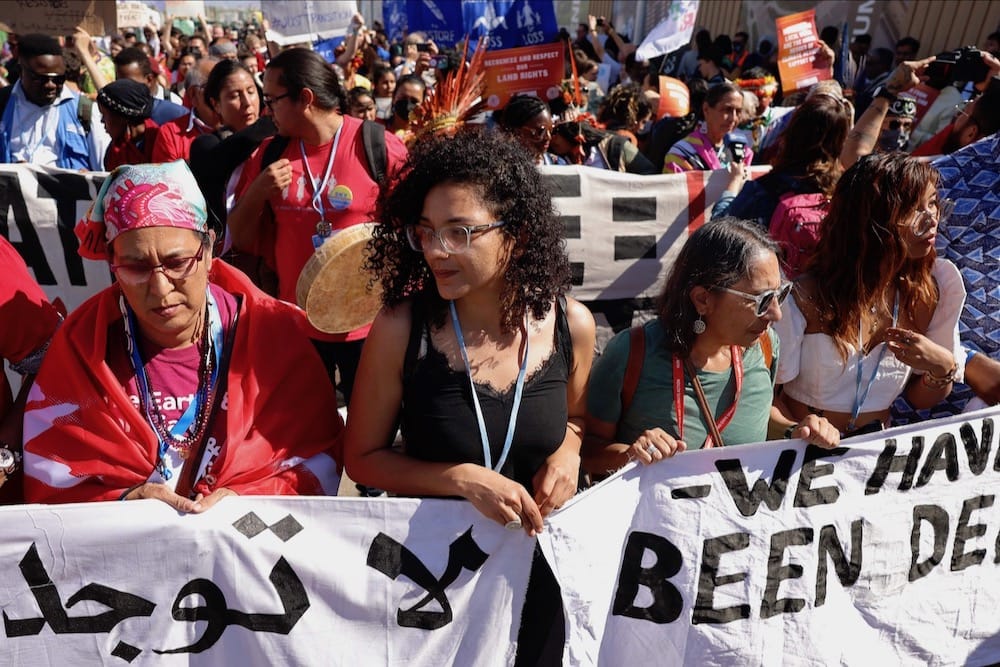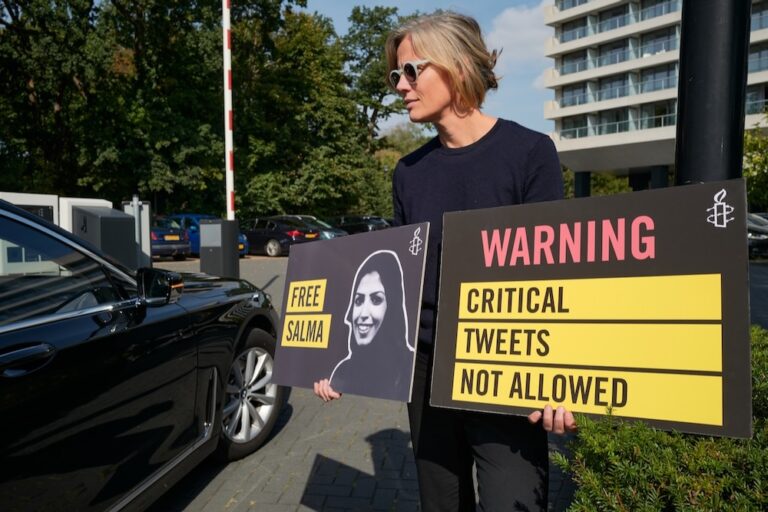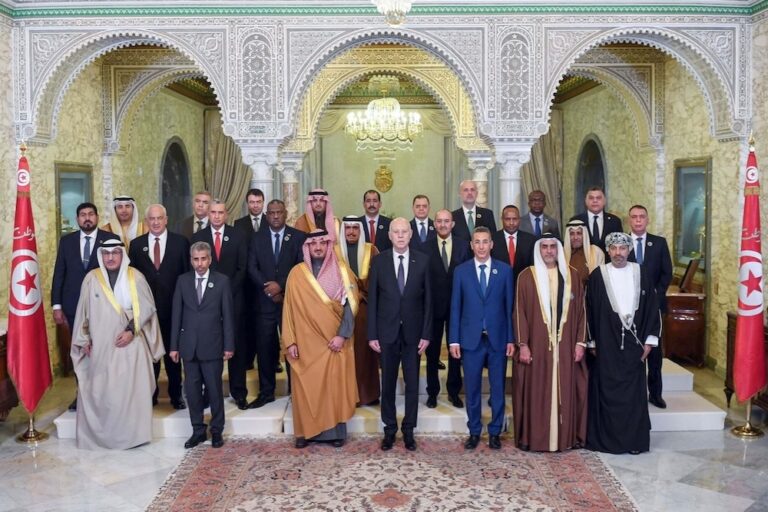IFEX's Regional Editor Naseem Tarawnah reflects on a year in the MENA region with more than its share of dark stories, but shares reasons for hope grounded in the work of civil society - persistent, collaborative, strategic - and effective.
In a year marked by growing restrictions on free expression and the shrinking of civic space under oppressive regimes, civil society in MENA persisted in their fight for human rights. From the formation of Sudan’s first independent journalists union, to groundbreaking trials for victims in Syria, to voices of resistance against unjust laws emanating from Egyptian prison cells and the streets of Iran – these were some of the most notable efforts by civil society in the region.
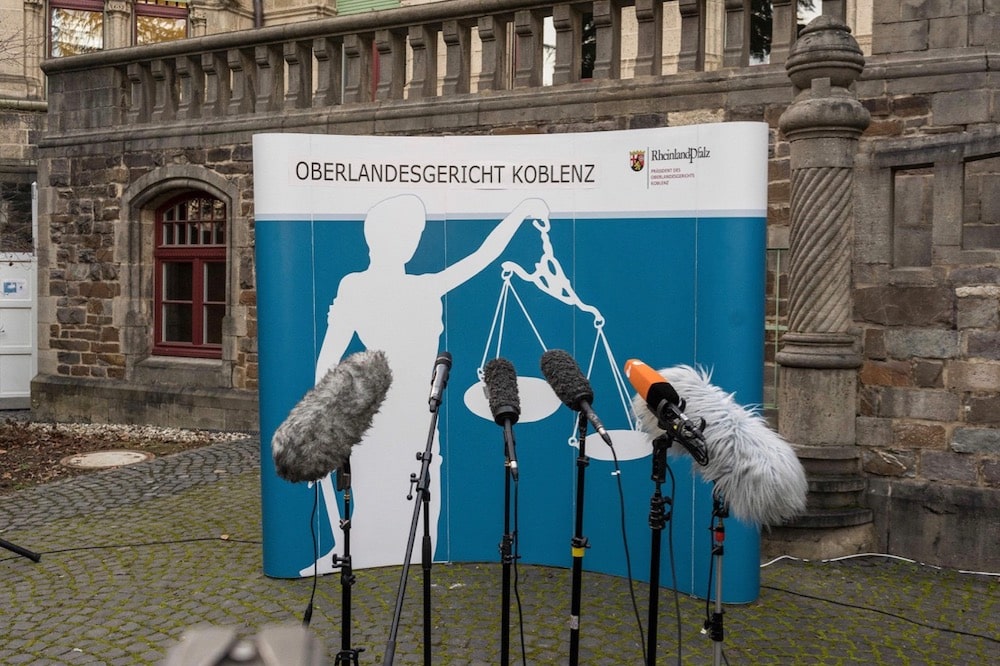
Microphones are set up in front of a banner with an image of “Justitia” (Justice), ahead of a press conference outside the courthouse in Koblenz, Germany, 13 January 2022, after former Syrian intelligence officer Anwar Raslan was sentenced to life in jail for crimes against humanity. BERND LAUTER/AFP via Getty Images
Landmark trials
Last January saw progress made towards achieving justice for victims of the Syrian government’s atrocities. In a landmark case, Anwar Raslan, a former colonel in Syrian intelligence, was sentenced to life in jail for crimes against humanity by a German court in Koblenz. Raslan is linked to the torture of over 4,000 people in 2011 and 2012, during the country’s civil war.
The historic trial’s verdict was the result of years of efforts by human rights attorneys and civil society groups, as well as the 80 witnesses and survivors whose testimonies helped expose the scope of the atrocities in Syria’s detention centres. Last year also saw the trial of a Syrian doctor, accused of torturing and murdering dissidents, move forward in a Frankfurt court.
The trials are highly significant, paving the way for further efforts to hold Syrian authorities accountable in international courts, and have been a stark reminder of the countless victims that have disappeared in Syria.
Human Rights Watch and Amnesty International have continued to push UN member countries to establish an international, independent entity to track and identify those missing and disappeared since the start of the crisis in 2011. In August 2022, UN Secretary-General António Guterres proposed the mechanism in a report highlighting how to bolster efforts to address the thousands of detained and disappeared and provide support to victims, survivors and the families of those missing.
The secretary-general’s proposal was also backed by the UN Commission of Inquiry on Syria, and called on the UN General Assembly to move swiftly in establishing the new entity, writing:
“Experience globally shows that the longer it takes to establish such a mechanism, the more difficult it will be to ever clarify the fate and whereabouts of the missing and those forcibly disappeared.”
The battles of empty stomachs
Across the region, prisoners of conscience languishing behind bars launched several collective hunger strikes last year in an effort to draw attention to their unjust detentions.
In Egypt, home to some 60,000 political prisoners, 12 activists began hunger strikes in February to protest their endless pretrial detentions and medical negligence in the country’s notorious prisons. They include pro-democracy activist and blogger Abdulrahman Tareq “Moka” who was eventually released in June after spending over two years in pretrial detention.
Human rights activist Ramy Shaath was released in January 2022 after serving 900 days in detention, and being forced to renounce his Egyptian nationality and be deported from the country. In December, backed by rights groups, Shaath and his wife Céline Lebrun-Shaath filed a complaint against the Egyptian government to the African Commission on Human and Peoples’ Rights (ACHPR), in an effort to hold the Egyptian officials accountable for violations committed against them.
Meanwhile, writer and activist Alaa Abd El Fattah’s six-month hunger strike drew international attention to Egypt’s human rights crisis during its hosting of the UN Climate Change Conference (COP27) in November. In solidarity with political prisoners and Abd El Fattah’s decision to embark on a full hunger-strike during COP27, three women journalists – Rasha Azab, Eman Auf, and Mona Selim – also launched a hunger strike, staging a week-long peaceful sit-in inside the Egyptian Journalists Syndicate to call on the union to step up and defend the rights of imprisoned journalists.
Dozens of Palestinian political prisoners in Israeli jails launched hunger strikes to protest their arbitrary “administrative detentions” without charge or trial. According to reports, at least 800 Palestinians were held last year under the Israeli policy that allows for the indefinite detention of Palestinians based on “secret information” that is not disclosed to them or their attorneys. Political prisoners also pushed back against the unjust detentions by launching a collective boycott of Israeli military courts, refusing to participate in all court proceedings.
Political prisoner Khalil Awawdeh ended a 182-day hunger strike from a hospital bed last August after Israeli authorities agreed not to renew his detention that was due to end in October. However, as the year closed, Awawdeh remained detained.

Sudanese journalist and head of the election committee Faysal Saleh votes to elect a union leader and executive committee, after an absence of 33 years due to the dissolution of this body in 1989, in Khartoum, Sudan, 27 August 2022. ASHRAF SHAZLY/AFP via Getty Images
A historic journalists’ union
In a momentous achievement, journalists in Sudan formed the country’s first independent union in over 30 years. Journalists elected Abdulmoniem Abu Idrees, Khartoum correspondent for Agence France-Presse, as the syndicate’s first president. Abu Idrees said:
“It will be a notable day for the unions, a day in which we exercise our democracy under a military rule and despite all the manacles that prevent[ed] us from doing so. I believe that other professions will follow suit.”
The new syndicate signified a positive step towards defending freedom of expression and the press in a country where media and journalists continue to face attacks while covering the demonstrations that began after the October 2021 military coup.
The past year saw pro-democracy protesters, largely mobilised by neighbourhood ‘resistance committees’, push back against military rule in near-weekly protests across the country. At least 100 people have died as a result of the excessive violence employed by security forces to quell the movement, including the use of tear gas, rubber bullets, and vehicles ramming protesters.
As a result of pressure from Sudanese lawyers and doctors, Sudan’s General Attorney announced in December a committee tasked with investigating the use of tear gas projectiles illegally used against protesters. In the same month, a framework agreement between the military, armed groups and political parties was rejected by protesters and civil society organisations, which called out its omission of key justice reforms that would end the country’s cycle of impunity.
Pursuing justice and accountability
The brutal killing of Palestinian American journalist Shireen Abu Akleh by Israeli forces last May brought to light the violent environment in which Palestinian journalists work, and Israel’s culture of impunity that sustains it. The veteran Al Jazeera journalist and her crew were fired upon by the Israeli military while covering military raids of a refugee camp in Jenin.
The months that followed saw civil society mobilised in the pursuit of accountability for Abu Akleh’s death. In December, Al Jazeera submitted a formal request to the International Criminal Court (ICC) to investigate and prosecute those responsible for the veteran journalist’s killing. The request came after months of investigations carried out by the UN, Palestinian and Israeli human rights groups that all concluded Abu Akleh was shot by an Israeli soldier.
In November, the US announced it would launch an FBI probe, following demands by Abu Akleh’s family for a “thorough, transparent investigation” that would reveal the chain of command leading to the death of an American citizen.
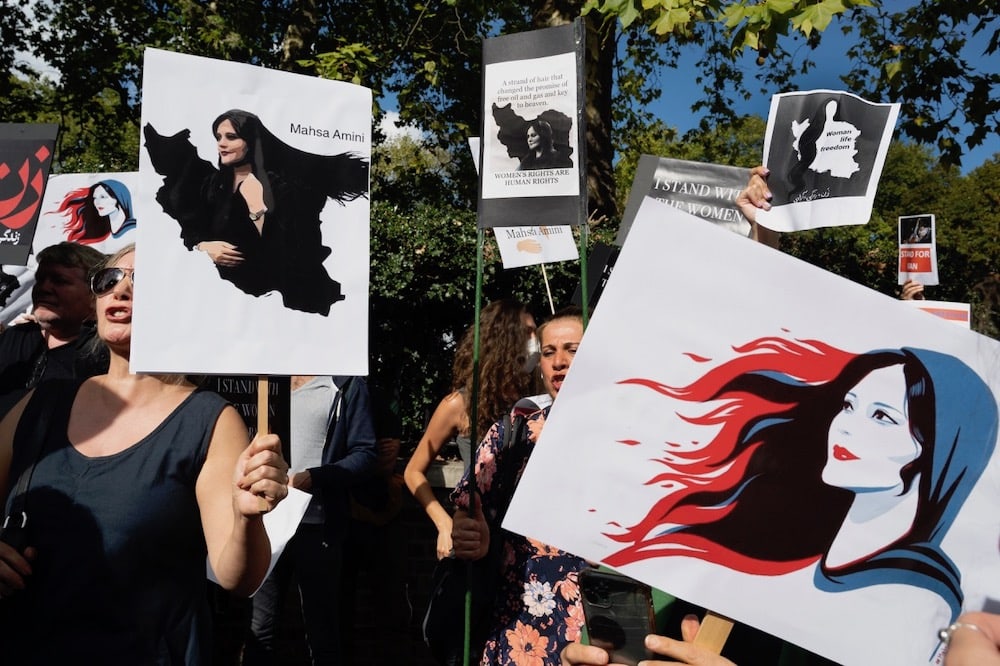
People demonstrate in front of the Embassy of Iran in London, UK, in solidarity with demonstrations in Iran and to protest the death of Mahsa Amini, the 22-year-old woman killed in Iran after being arrested for breaking hijab laws, 24 September 2022. Jenny Matthews/In Pictures via Getty Images
The rights of protesters and the rights of women
Iran has been roiled by protests since the September tragic killing of a 22-year old Iranian-Kurdish woman, Mahsa (Jhina) Amini, at the hands of the country’s morality police, sparked public outrage. The weeks that followed saw unprecedented anti-government protests across the country met with a violent crackdown by security forces. Hundreds have been reportedly killed, thousands arrested, and a string of death sentences handed out in an effort to silence the movement.
Early on, rights groups pressed the UN to establish an independent, investigative, reporting and accountability mechanism to address Iran’s human rights violations during the protests.
In November 2022, the UN Human Rights Council announced the formation of an independent fact-finding mission and appointed three women commissioners to the task of investigating Iran’s response to protests.
Weeks later, the UN also voted to remove Iran from its women’s rights commission, in another move welcomed by activists. A UN statement said the Iran regime “continuously undermines and increasingly suppresses the human rights of women and girls, including the right to freedom of expression and opinion, often with the use of excessive force.”
Whether on the streets, behind a camera, in court rooms, or from behind bars, the concerted efforts of civil society in the region to defend human rights and hold oppressive regimes accountable during the previous year served as a powerful reminder of the impact of collective action.
In Brief
Twitter employee found guilty for spying on Saudi dissidents: In a small step towards accountability for the surveillance of Saudi dissidents, former Twitter employee Ahmad Abouammo, was found guilty by a US court in August for spying on behalf of Saudi Arabia. Abouammo and two other Saudi citizens working at the social media company were accused of giving Saudi authorities access to user information on thousands of accounts, including murdered journalist Jamal Khashoggi, dissident living in exile, Omar Abdulaziz, and imprisoned humanitarian worker Abdulrahman Al-Sadhan, who is currently serving 20 years in prison for authoring an anonymous satirical twitter account. Abdulrahman’s sister, Areej Al-Sadhan, provided key testimony for the prosecution in a case that connected Abouammo to a key aide of Saudi Crown Prince Mohammed bin Salman who oversaw the arrest and imprisonment of activists. Though unable to detail her brother’s torture, her testimony highlighted the impact of Abouammo’s espionage on the lives of Saudi citizens put at risk as a result.
Regional rights groups achieve consultative status at the UN: Expanding civil society participation from the region at the UN, last year saw several IFEX members obtaining consultative status at the UN Economic and Social Affairs Council (ECOSOC), including the Gulf Centre for Human Rights, the Bahrain Center for Human Rights, and the Arab Center for the Advancement of Social Media (7amleh). The consultative status provides independent civil society organisations access to the council, and a greater platform to amplify their human rights work.
In Memoriam: Lastly, December brought the sad news of the passing of journalist and activist Mousa Rimawi. The director of IFEX member Palestinian Center for Development and Media Freedoms, Rimawi was a fierce advocate for free expression, press freedom, and the struggle of the Palestinian people, and will be deeply missed.
